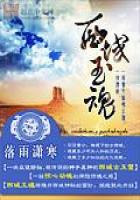A member of every Davis Cup team since the matches were inaugurated, a doubles player of the highest strategy, Roper Barrett needs no introduction or analysis.His, game is soft.His service looks a joke.In reality it is hard to hit, for Barrett pushes it to the most unexpected places.His ground strokes, soft, short, and low, are ideal doubles shots.He angles off the ball with a short shove in the direction.He can drive hard whenpressed, but prefers to use the slow poke.
His volleying is the acme of finesse.He angles soft to the side-lines, stop volleys the hardest drives successfully.He picks openings with an unerring eye.His overhead lacks "punch," but is steady and reliable.
Barrett is a clever mixer of shots.He is playing the unexpected shot to the unexpected place.His sense of anticipation is remarkable, and he retrieves the most unusual shots.It is his great tennis tactics that make him noteworthy.His game is round but not wonderful.
THE LOWES, A.H.AND F.G.
The famous brothers, called indiscriminately the Lowes, are two of the best baseline players in the British Isles.Both men play almost identical styles, and at a distance are very hard to tell apart.
Gordon Lowe uses a slice service, while Arthur serves with a reverse spin.Neither man has a dangerous delivery.Both are adequate and hard to win earned points from.
The ground strokes of the Lowes are very orthodox.Full swing, top spin drives fore- and backhand, straight or 'cross court, are hit with equal facility.The Lowes volley defensively and only come in to the let when pulled in by a short shot.Their overhead work is average.
Their games are not startling.There is nothing to require much comment.Both men are excellent tennis players of the true English school: fine base- line drivers, but subject to defeat by any aggressive volleyer.It is a lack of aggressiveness that holds both men down, for they are excellent court coverers, fine racquet wielders, but do not rise to real heights.The Lowes could easily defeat any player who was slightly off his game, as they are very steady and make few mistakes.Neither would defeat a first- class player at his best.
T.M.MAVROGORDATO
One of the most consistent winners in English tennis for a span of years is a little man with a big name, who is universally and popularly known as "Mavro.""Mavro" added another notable victory in 1920, when he defeated R.
N.Williams in the last eight in the World Championships."Mavro" has always been a fine player, but he has never quite scaled the top flight.
His game is steadiness personified.He shoves his service in the court at the end of a prodigious swing that ends in a poke.It goes where he wishes it.His ground strokes are fine, in splendid form, very accurate and remarkably fast for so little effort.Mavro is not large enough to hit hard, but owing to his remarkable footwork he covers a very large territory in a remarkably short space of time.His racquet work is a delight to a student of orthodox form.His volleying is accurate, steady, well placed but defensive.He has no speed or punch to his volley.His overhead is steady to the point of being unique.He is so small that it seems as if anyone could lob over his head, but his speed of foot is so great that he invariably gets his racquet on it and puts it back deep.
Mavro turns, defence into attack by putting the ball back in play so often that his opponent gets tired hitting it and takes unnecessary chances.His accuracy is so great that it makes up for his lack of speed.His judgment is sound but not brilliant.He is a hard-working, conscientious player who deserves, his success.
There are many other players who are interesting studies.The two Australians, now living in England, and to all intents and purposes Englishmen, Randolph Lycett and F.M.B.Fisher, are distinct and interesting types of players.C.P.Dixon, Stanley Doust, M.J.G.Ritchie, Max Woosnam, the rising young star, P.M.Davson, A.E.Beamish, W.C.Crawley, and scores of other excellent players, will carry the burden of English tennis successfully for some years.Yet new blood must be found to infuse energy into the game.Speed is a necessity in English tennis if the modern game is to reach its greatest height in the British Isles.
Youth must be seen soon, if the game in the next ten years is to be kept at its present level.Parke, Mavro, Ritchie, Dixon, Barrett, etc., cannot go on for ever, and young players must be developed to take their places.The coming decade is the crucial period of English tennis.I hope and believe it will be successfully passed.















